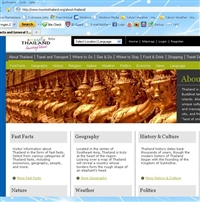Intercultural communication and the Internet

Thai tourism website
The Internet provides an important source of opportunities for intercultural communication and contact through English. English is by far the most common language on the Internet both for websites and communication. However, as with other forms of English communication it is not only native speakers who use English on the Internet. Many cultures and countries are represented through English on the Internet.
In the first activity you will consider the different ways you can link with information and people from other cultures through the Internet and in the second activity you will examine some representations of culture on the Internet.
Activity 1: Opportunities for intercultural communication on the Internet
The Internet provides a wide range of different ways for both communicating with people from other cultures and experiencing other cultures. In this activity you will consider some of the different opportunities the Internet offers.
Instruction
Make a list in the box below of all the different ways you can come into contact with other cultures on the Internet. Then read the feedback. Some examples are given in the help.
Activity 2: Representations of cultures on the Internet
In this activity you are going to investigate a representation of your own culture on the Internet and then compare this with representations of another culture, Korea. You will do this through exploring the official tourism websites for each country.
Instruction
Click on the links to the websites for tourism in Thailand and Korea. Then answer the questions below.
Tourism Thailand Website
Visit Korea Website
On the official Thai tourism website look at the headings and links on the page, what information is included on this page (do not look at the other pages yet)? Select your answers from the list below.
Now do the same of the Korean website (again do not look at any other pages yet). Then read the feedback.
Now explore the two websites in more detail.
Is there anything that you think is missing from the websites? Make notes. Then read the feedback.
Do you think the Thai website gives an accurate representation of Thailand and Thai culture as you experience it? Make notes. Then read the feedback.
© eLanguages, Modern Languages and Linguistics, University of Southampton, 2010. All rights reserved.